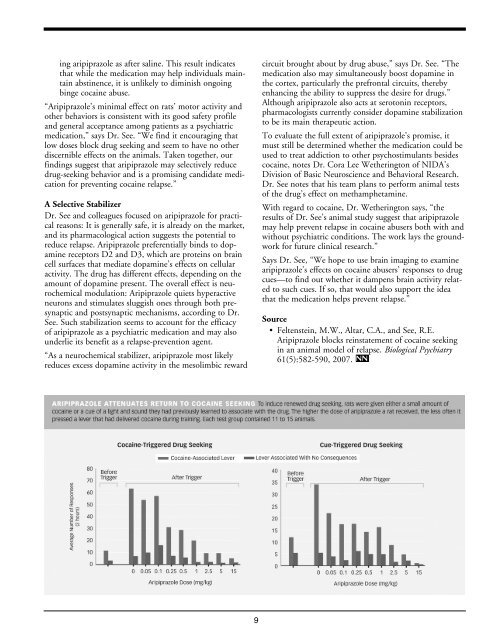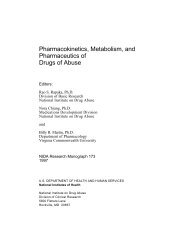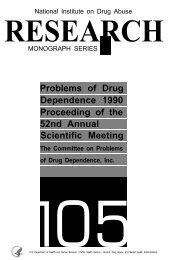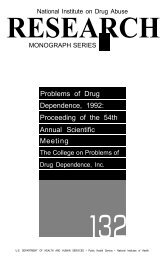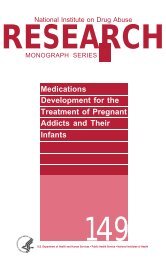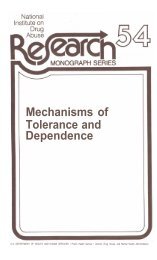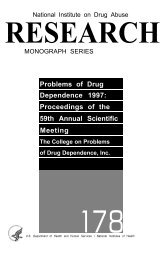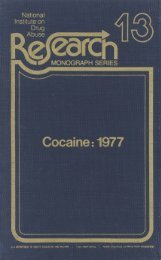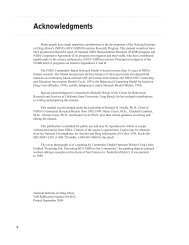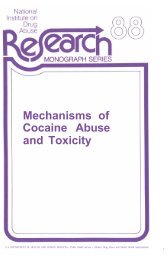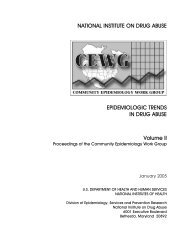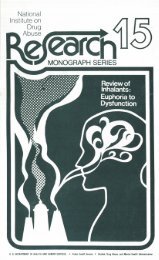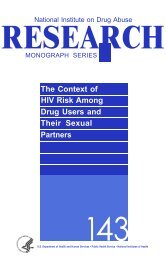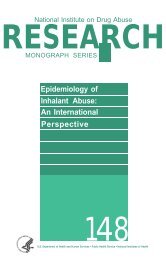Research on Cocaine - Archives - National Institute on Drug Abuse
Research on Cocaine - Archives - National Institute on Drug Abuse
Research on Cocaine - Archives - National Institute on Drug Abuse
Create successful ePaper yourself
Turn your PDF publications into a flip-book with our unique Google optimized e-Paper software.
ing aripiprazole as after saline. This result indicates<br />
that while the medicati<strong>on</strong> may help individuals maintain<br />
abstinence, it is unlikely to diminish <strong>on</strong>going<br />
binge cocaine abuse.<br />
“Aripiprazole’s minimal effect <strong>on</strong> rats’ motor activity and<br />
other behaviors is c<strong>on</strong>sistent with its good safety profile<br />
and general acceptance am<strong>on</strong>g patients as a psychiatric<br />
medicati<strong>on</strong>,” says Dr. See. “We find it encouraging that<br />
low doses block drug seeking and seem to have no other<br />
discernible effects <strong>on</strong> the animals. Taken together, our<br />
findings suggest that aripiprazole may selectively reduce<br />
drug-seeking behavior and is a promising candidate medicati<strong>on</strong><br />
for preventing cocaine relapse.”<br />
A Selective Stabilizer<br />
Dr. See and colleagues focused <strong>on</strong> aripiprazole for practical<br />
reas<strong>on</strong>s: It is generally safe, it is already <strong>on</strong> the market,<br />
and its pharmacological acti<strong>on</strong> suggests the potential to<br />
reduce relapse. Aripiprazole preferentially binds to dopamine<br />
receptors D2 and D3, which are proteins <strong>on</strong> brain<br />
cell surfaces that mediate dopamine’s effects <strong>on</strong> cellular<br />
activity. The drug has different effects, depending <strong>on</strong> the<br />
amount of dopamine present. The overall effect is neurochemical<br />
modulati<strong>on</strong>: Aripiprazole quiets hyperactive<br />
neur<strong>on</strong>s and stimulates sluggish <strong>on</strong>es through both presynaptic<br />
and postsynaptic mechanisms, according to Dr.<br />
See. Such stabilizati<strong>on</strong> seems to account for the efficacy<br />
of aripiprazole as a psychiatric medicati<strong>on</strong> and may also<br />
underlie its benefit as a relapse-preventi<strong>on</strong> agent.<br />
“As a neurochemical stabilizer, aripiprazole most likely<br />
reduces excess dopamine activity in the mesolimbic reward<br />
9<br />
circuit brought about by drug abuse,” says Dr. See. “The<br />
medicati<strong>on</strong> also may simultaneously boost dopamine in<br />
the cortex, particularly the prefr<strong>on</strong>tal circuits, thereby<br />
enhancing the ability to suppress the desire for drugs.”<br />
Although aripiprazole also acts at serot<strong>on</strong>in receptors,<br />
pharmacologists currently c<strong>on</strong>sider dopamine stabilizati<strong>on</strong><br />
to be its main therapeutic acti<strong>on</strong>.<br />
To evaluate the full extent of aripiprazole’s promise, it<br />
must still be determined whether the medicati<strong>on</strong> could be<br />
used to treat addicti<strong>on</strong> to other psychostimulants besides<br />
cocaine, notes Dr. Cora Lee Wetheringt<strong>on</strong> of NIDA’s<br />
Divisi<strong>on</strong> of Basic Neuroscience and Behavioral <str<strong>on</strong>g>Research</str<strong>on</strong>g>.<br />
Dr. See notes that his team plans to perform animal tests<br />
of the drug’s effect <strong>on</strong> methamphetamine.<br />
With regard to cocaine, Dr. Wetheringt<strong>on</strong> says, “the<br />
results of Dr. See’s animal study suggest that aripiprazole<br />
may help prevent relapse in cocaine abusers both with and<br />
without psychiatric c<strong>on</strong>diti<strong>on</strong>s. The work lays the groundwork<br />
for future clinical research.”<br />
Says Dr. See, “We hope to use brain imaging to examine<br />
aripiprazole’s effects <strong>on</strong> cocaine abusers’ resp<strong>on</strong>ses to drug<br />
cues—to find out whether it dampens brain activity related<br />
to such cues. If so, that would also support the idea<br />
that the medicati<strong>on</strong> helps prevent relapse.”<br />
Source<br />
• Feltenstein, M.W., Altar, C.A., and See, R.E.<br />
Aripiprazole blocks reinstatement of cocaine seeking<br />
in an animal model of relapse. Biological Psychiatry<br />
61(5):582-590, 2007.


